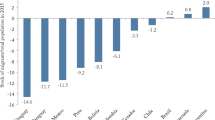Abstract.
This paper analyzes both the formation of long-run migration incentives and the consequences of a regime change from “autarky” to “free migration” in an overlapping-generations framework with two countries. Under autarky the countries may differ with respect to their aggregate savings rate or with respect to their pension-wage ratio. It is shown that an individual prefers to live in a country where the capital-labor ratio is close to the Golden Rule level and where his characteristics are relatively scarce. Both the migration incentives and the consequences of free migration are determined by these two effects.
Similar content being viewed by others
Author information
Authors and Affiliations
Additional information
Received: 2 March 1998/Accepted: 10 February 1999
Rights and permissions
About this article
Cite this article
Meier, V. Time preference, international migration, and social security. J Popul Econ 13, 127–146 (2000). https://doi.org/10.1007/s001480050127
Issue Date:
DOI: https://doi.org/10.1007/s001480050127




